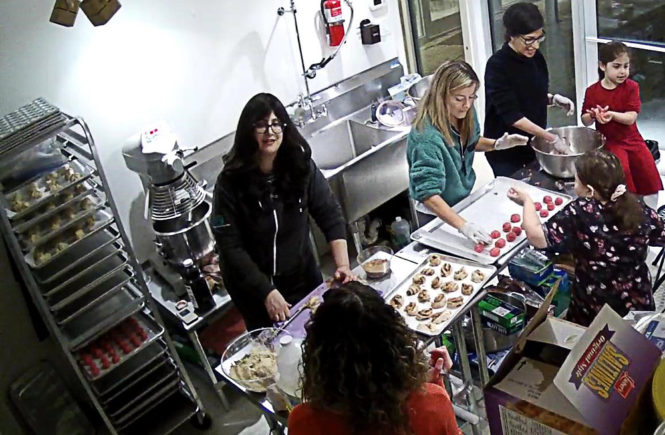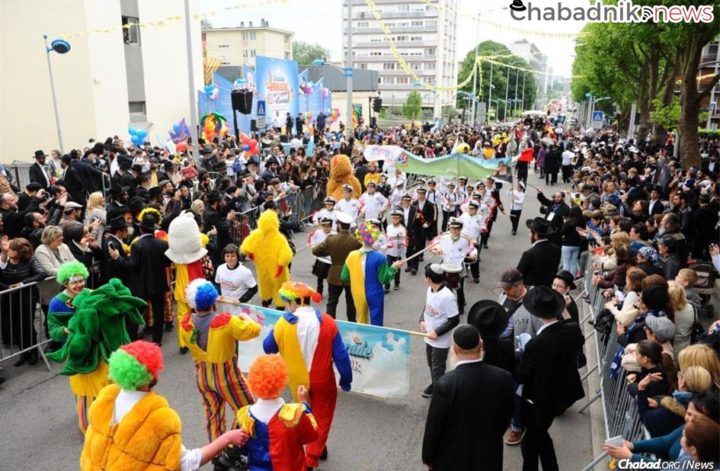Disability inclusion, mental-health awareness in communities around the world
Combining
the spiritual beauty of Shabbat with classes, workshops and panel
discussions at 600 locations around the world, ShabbaTTogether
gatherings, Feb. 7-9, coordinated by the Ruderman Chabad Inclusion
Initiative, highlighted the importance of inclusion within Jewish
communities worldwide.
Nina Pfrenger, a student at Texas A&M
University, said she was deeply impressed by ShabbaTTogether in College
Station, Texas, hosted by Rabbi Yossi and Manya Lazaroff, co-directors
of the Chabad-Lubavitch Jewish Student Center at Texas A&M
University.
“Manya Lazaroff spoke beautifully about what
inclusion means and how inclusion is such a Jewish concept, being that
Judaism is all about unity and connection,” Pfrenger told Chabad.org.
She thought it was special that a group of Jewish college students from
Stony Brook on Long Island, N.Y., traveled all the way to College
Station to take part in their ShabbaTTogether. “It added to the feeling
of unity. I’m really glad I got to participate in such a unique event.”
Explaining
that she believes that mental-health awareness is “the call of the
hour,” Manya Lazaroff said that the resources that RCII provided her
gave her the tools to create lasting impact in her community of college
students, opened up a vital dialogue and created a space for students to
begin connecting and sharing. She also is working on a program called
“ReJOYvination 360,” to break the stigmas surrounding mental health.
“Our
initiative is about taking student wellness and mental health
seriously,” said Lazaroff. “We have a local psychologist who is a
consultant for this initiative, and a board of students who decided to
get involved as a result of their life experience, as well as their
knowledge of the challenges that their fellow students face on a daily
basis.”
Lazaroff noted that Chabad at Texas A&M has already
held Mental Health First Aid training for the students, and they are
looking forward to a Safetalk workshop in the fall. She said her goal is
to empower students to continue learning and to open up about this
vital topic.
“We want our students to be educated on both
physical disabilities and also the ‘invisible disabilities’ that affect
college students across the globe,” said Lazaroff. “The ‘ReJOYvination
360’ program is a multifaceted initiative that will include workshops,
dinner and discussions and other educationally enriching programs to
help our students learn how to be first-responders when it comes to
mental health.”
In Houston, ShabbaTTogether began with a Friday
night dinner, led by Rabbi Chaim Lazaroff, co-director of Chabad of
Uptown, with his wife, Chanie, for young professionals and young adults
with disabilities from The Friendship Circle of Houston. On Shabbat day,
Rabbi Dovid Goldstein, director of Friendship Circle of Houston, spoke
about the idea and importance of inclusion. On Sunday, an eight-hour
course trained people in Mental Health First Aid.
Bill Coorsh’s
daughter, Jodie, is a young woman with disabilities and a member of
Chabad’s Friendship Circle. “The ShabbaTTogether event, hosted by Chabad
of Uptown, was fabulous,” Bill Coorsh said. “Rabbi Lazaroff and
Rebbetzin Chanie know Jodie and always make her feel comfortable and
welcome. It’s really great to see such love and inclusion of people with
disabilities within the Chabad community here.”
The
second-annual International ShabbaTTogether weekend represented a
significant expansion by the Ruderman Chabad Inclusion Initiative,
growing from 260 venues last year to 600 this year.
Topics such
as “The Theory of Inclusion, Human Worth and Dignity” and “The Thing
About Normal” were addressed head on. The intention was to spark
conversations and open up new avenues of dialogue for adults and teens
with disabilities and mental-health conditions to feel physically and
emotionally supported at the Jewish communal institutions they attend.
“Our
main goal in creating the ShabbaTTogether weekend was to start the
conversation on inclusion,” said Dr. Sarah Kranz-Ciment, PT, DPT,
director of the RCII. “The truth is inclusion is not a weekend thing.
It’s a mindset shift, a way of living and leading. Our goal is to get
the conversations started and to turn inclusion from a daunting task and
a largely misunderstood topic into a manageable, attainable goal.”
Deepening
global awareness and spreading information on inclusion is something
that Kranz-Ciment hopes will expand from year to year. This year’s
ShabbaTTogether aimed to specifically focus on mental-health awareness,
which affects 25 percent of teenagers.
Chaya Howel, a college
student from Valencia, Calif., who is associated with both Chabad of the
University of Southern California and Chabad of California State
University, Northridge, shared that as she’s gotten to know Chabad more,
she’s embraced the fact that her mental-health condition isn’t
something to be ashamed of.
“The loving approach of Hasidism,
together with medication and therapy, has really healed me,” she said.
“I’m the happiest I’ve ever been. ShabbaTTogether is especially
meaningful to me. It makes a statement that people with disabilities and
mental-health conditions have a strong place within the Jewish
community.”



